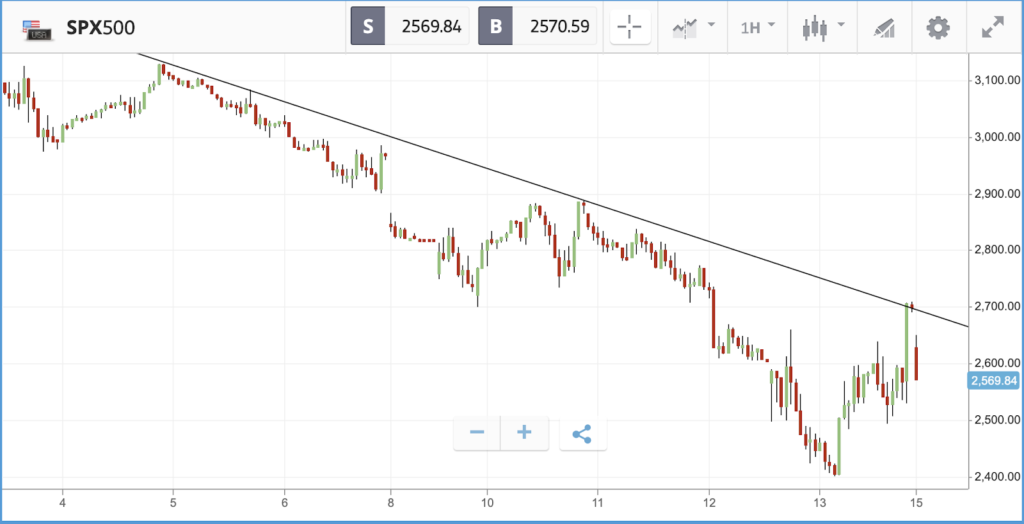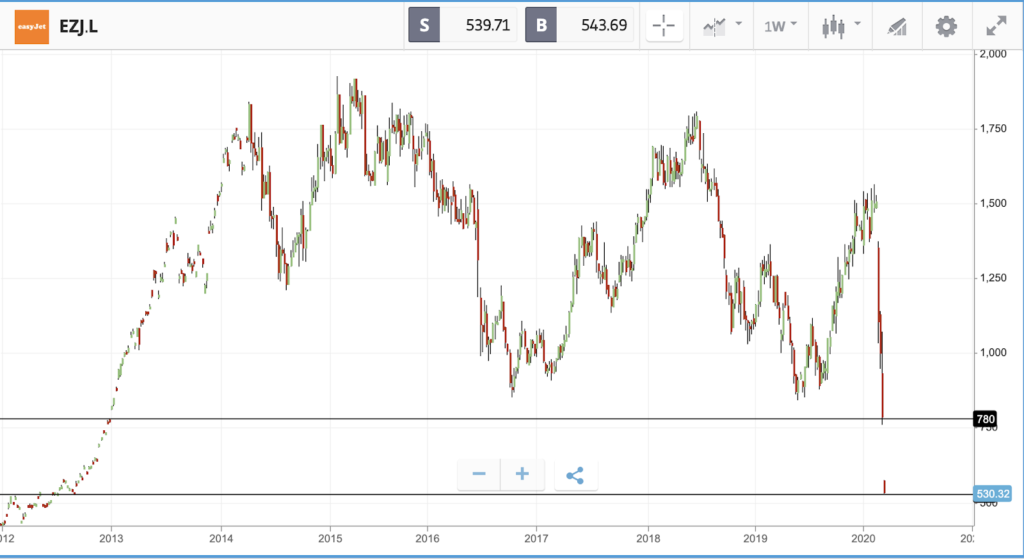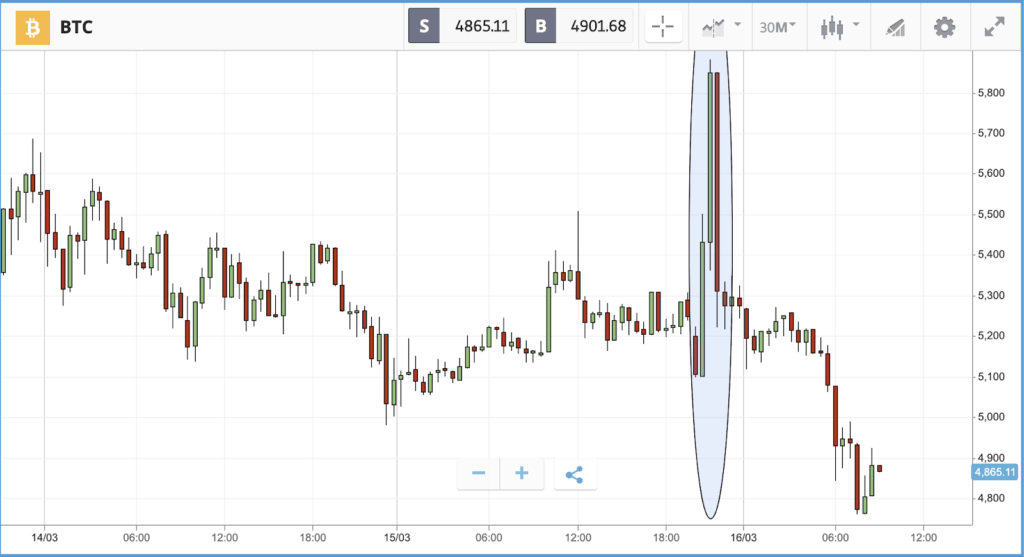The Federal Reserve stepped up its response to the coronavirus epidemic last night, cutting the benchmark interest rate to a 0-0.25% range and announcing that it will buy $700bn in US Treasuries and mortgage backed securities in a bid to shore up markets and prep the economy.
Japan followed suit, unveiling a huge spending programme to buy equities and other assets.
Similar to the rate cut earlier this month, markets reacted violently to the move. US equity futures hit a 5% ‘limit down’ cutoff on Sunday night, indicating that Monday’s US market open will be significantly lower. Rather than reassure markets, this surprise move has served to spook them further as investors worry the situation is worse than previously thought. The Fed has now put the ball back in the government’s court to complement this further monetary easing with more fiscal measures to stem the economic damage of the outbreak.

European markets opened lower this morning as lockdown measures became more widespread over the weekend and the US rate cut caused sterling and the euro to rally against the greenback. The FTSE starts with a 4 for the first time in 9 years as commodity and travel stocks continue to get hammered. There is real concern for the airlines as they are forced to cancel hundreds of flights, easyJet is down over 30% on the day. International Consolidated Airlines, the parent company of British Airways, is down 28% and the biggest faller is TUI down 38%.

Two emergency rate cuts in short succession take the US central interest rate back to its 2015 level, before the Fed began incrementally raising rates as the economy shook off its post-crisis stagnation. Fed chairman Jerome Powell said that the central bank is “prepared to use its full range of tools to support the flow of credit to households and businesses.”
The Fed also instigated other emergency measures on Sunday, including increasing big bank access to short-term liquidity, as more forecasters put out predictions that the economy will enter a recession. Powell was careful to stress that the influence of the Fed has limits, and that it will be down to fiscal policy to minimise the hurt for disrupted businesses and industries. Part of the concern now will be whether the Fed has used all of its ammunition, and what action it can take from here if the situation deteriorates more than it has already planned for.
The latest news on the coronavirus response from the weekend included Apple shutting all of its stores outside of China, Starbucks instituting a to-go only policy, and luxury goods giant LVMH turning all of its cosmetic factories over to making hand sanitizer to be distributed for free. President Trump also extended the US travel ban to include visitors from the UK and Ireland, in addition to the broader swathe of European countries announced late last week.
Meanwhile the gold price is still yet to act as a safe haven, falling sharply to $1,547, although it is trading marginally higher this morning.
Historic week for US stocks
Last week involved a number of historic markers for US stocks, including the worst fall for the S&P 500 since 1987 on Thursday, followed by the ninth biggest daily gain of all-time on Friday. Over the weekend, Goldman Sachs analyst David Kostin suggested that the S&P 500 might not bottom out until the 2,000 point level, versus its 2,711 Friday close. Kostin also noted that event-driven bear markets are usually followed by sharp rebounds, and that Goldman’s expectation is for the S&P to end 2020 at 3,200 points. Friday’s rally was topped by many of the financial, travel and energy names that had been hit hardest earlier in the week. Morgan Stanley climbed 19.8% after falling 25% for the week to Thursday, while Boeing gained 9.9% after seeing more than 40% of its market value wiped out earlier in the week. Investment firm John Hancock noted on Friday that small-cap stocks suffered bigger losses than their large cap counterparts over the course of the week, with the Russell 2000 index falling 17%. Also during the week, the Cboe Volatility Index, which measures investors’ expected volatility over the next 30 days, jumped close to records set during the global financial crisis.
One knock-on impact of the current turmoil — M&A transactions are likely to be put on ice. While Aon announced its $30bn purchase of Willis Towers Watson early last week, Xerox reportedly put its hostile campaign to takeover HP Inc on hold, and a significant slowdown in deal activity should be expected.
S&P 500: +9.3% Friday, -16.1% YTD (-8.8% week)
Dow Jones Industrial Average: +9.4% Friday, -18.8% YTD (-10.4% week)
Nasdaq Composite: +9.4% Friday, -12.2% YTD (-8.2% week)
UK stocks miss out on late US rally
While the FTSE 100 closed 2.5% higher on Friday, UK stocks did not take part in the mammoth rally enjoyed by their American counterparts, leaving both the FTSE 100 and FTSE 250 down 17% over the course of the week. The FTSE 100 did rise by more than 8% during the first half of the day, but collapsed back after lunch. UK markets were also long-closed by the time President Trump made his speech declaring a state of emergency in the US, which led to a late-day rally (due to relief about a more coordinated response to the virus) that accounted for much of the daily gain in US stocks.
Both the FTSE 100 and 250 are now close to recording 30% losses year-to-date. Cruise firm Carnival and airline Tui brought up the back of the FTSE 100 on Friday, with daily losses of 9.9% and 6.5% respectively. Tui has now lost more than 60% of its value since February 11th and will likely be removed from the index of the UK’s 100 largest companies as a result. Over the weekend, the firm was forced to cancel flights to Spain after the government announced a lockdown, which led to some flights being forced to turn around in mid-air.
FTSE 100: +2.5% Friday, -28.9% YTD (-17% week)
FTSE 250: -1% Friday, -28.9% YTD (-17% week)
Stocks to watch
ZTO Express: ZTO Express is a Chinese delivery company that listed on the New York Stock Exchange in 2016, and now sits at a $20bn market cap. The firm has a significant partnership with Alibaba, which bought a 10% stake in ZTO two years ago. ZTO’s stock has risen during the coronavirus epidemic, as it is an obvious potential beneficiary of more shoppers switching to online options. Over the past year, its share price has increased by more than 30%. The company reports its latest set of quarterly earnings late evening New York time on Monday, with analysts certain to probe for early details of whether the epidemic has spurred demand for the company’s services, and whether increased demand combined with the virus has led to any disruptions to its services.
Antofagasta: UK-listed copper miner Antofagasta has shed 40% of its value from its 2020 peak back in January, the coronavirus outbreak is hitting commodity stocks hard as global demand wanes. As with all heavily affected industries, investors will be all ears as the company delivers an outlook update against the backdrop of huge changes in global conditions.
Coupa Software: Business software firm Coupa had a big 2019, with its share price more than doubling after repeatedly beating earnings expectations, although it has fallen around 30% over the past month amid the broader market sell-off. When the company reported its last quarterly earnings in December, analysts quizzed management on how much traction some of its newer add-on applications are getting with its existing client base, and adoption of its services outside of the US. Currently, 16 Wall Street analysts rate the firm as a buy or overweight, with eight rating it as a hold. The firm reports its latest quarterly update on Monday.
Get ready for bankruptcies
The fallout from the economic disruption caused by the coronavirus epidemic is likely to include bankruptcies, particularly among smaller and more heavily indebted energy and travel names. In Europe on Friday, Scandinavian Airlines announced that it is suspending operations and laying off most of its staff temporarily (although with no set end date) due to a complete lack of demand.
Smaller oil companies look most at risk of going bankrupt in the US, as they are facing both a price war kicked off by Russia and Saudi Arabia, and the broader epidemic disruption being felt across all industries. When times get tough, the oil giants tend to reign in dividends, cut costs and sell off non-core assets, but for smaller firms without such flexibility the results could be more dire. Debt ridden US shale oil producers, who can’t compete with Saudi Arabia on production costs, look first in line. Occidental Petroleum, Marathon Oil and Apache have all lost around two thirds of their value over the past month, and Occidental now has a market cap of just $13bn despite buying Anadarko for more than $50bn last year.
Crypto corner:

Ethereum is off 16% at $107.5, its lowest point since December 2018, while XRP is close to its record low of $0.1106, down at $0.135.
We are seeing margin calls in crypto backed loans with many lenders now demanding additional collateral from borrowers as the price tanks.
Double-digit falls for cryptoassets have taken bitcoin back to its lowest level since March of last year, off 15% at $4,838 as investors dump risk assets without prejudice. Initially, bitcoin rallied 12% in the wake of the Federal Reserve’s rate cut and stimulus package but shortly after pared all of those gains and then some.
eToro (UK) Ltd is authorized and regulated by the Financial Conduct Authority. eToro (Europe) Ltd is authorized and regulated by the Cyprus Securities and Exchange Commission. eToro AUS Capital Limited is regulated by the Australian Securities and Investments Commission, ABN 66 612 791 803, AFSL 491139.
This is a marketing communication and should not be taken as investment advice, personal recommendation, or an offer of, or solicitation to buy or sell, any financial instruments. This material has been prepared without having regard to any particular investment objectives or financial situation, and has not been prepared in accordance with the legal and regulatory requirements to promote independent research. Any references to past performance of a financial instrument, index or a packaged investment product are not, and should not be taken as, a reliable indicator of future results. eToro makes no representation and assumes no liability as to the accuracy or completeness of the content of this publication, which has been prepared utilizing publicly-available information.
eToro is a multi-asset platform which offers both investing in stocks and cryptoassets, as well as trading CFDs.
CFDs are complex instruments and come with a high risk of losing money rapidly due to leverage. 62% of retail investor accounts lose money when trading CFDs with this provider. You should consider whether you understand how CFDs work, and whether you can afford to take the high risk of losing your money.
Cryptoassets are volatile instruments which can fluctuate widely in a very short timeframe and therefore are not appropriate for all investors. Other than via CFDs, trading cryptoassets is unregulated and therefore is not supervised by any EU regulatory framework. Your capital is at risk.

